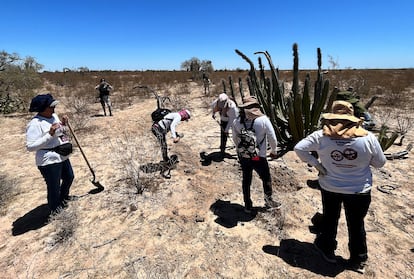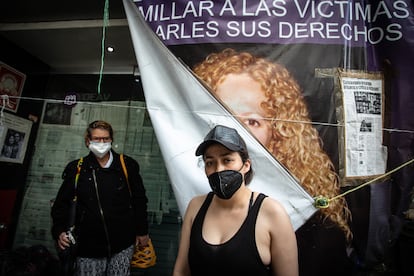Desperate mothers in Mexico negotiate with drug cartels in search of missing loved ones
Shunning the government, they instead seek help from organized crime groups to find the unmarked graves


Ceci Flores and Delia Quiroa were leading ordinary lives until a few years ago, when their families became victims of organized crime. Faced with government inaction, Flores set out on her own to find her two children, while Quiroa tirelessly searched for her missing brother. The years gradually turned them into human rights activists in a country grappling with a dire crisis of missing persons – over 110,000 people. Motivated by desperation and the lack of government assistance, these mothers faced the tough decision of seeking permission from drug traffickers to find the remains of their loved ones. “All we want is to have our lives respected and be able to search for our loved ones. We need an end to the constant disappearances, and for the cartels to finally sit down and negotiate peace among themselves,” said Quiroa.
Quiroa is part of the Madres Buscadoras de Tamaulipas group – mothers from this northeast Mexico state with missing family members. They made their first approach to the narcos in 2021, and were granted permission to dig in La Bartolina, a notorious mass gravesite close to the U.S. border on the Gulf Coast. They unearthed 1,100 pounds (500 kilos) of charred skeletal remains. “Families in Tamaulipas are really desperate because the authorities aren’t doing much to search for, identify and bring back our loved ones. That’s why we decided to send this message directly to the leader of Los Ciclones from the Gulf Cartel in Matamoros,” said the mothers’ initial request to the narcos.
Ceci Flores and her group of mothers tried this approach in Sonora and Sinaloa, and soon others all over Mexico followed suit. “I’m reaching out to the leaders of the cartels. We’re not looking for justice, all we want is to find our missing loved ones and give them a proper burial,” said Flores in a video posted on social media. Nine cartels have now been approached by these groups of mothers, including Cartel Jalisco New Generation, Sinaloa Cartel, Sonora Cartel, Salazar Cartel, La Familia Michoacana, Knights Templar and Old School Zetas.

A year later, news of the mothers’ efforts reached the Mexican president, Andrés Manuel López Obrador, when a reporter asked in the daily morning briefing, “What do you think about the truce these mothers have achieved?” The president replied, “We must endorse anything that strives for peace and eliminates violence.” But he then cautioned that his administration cannot guarantee that action won’t be taken against lawbreakers.
The president’s response came after the Northeast Cartel (CDN) shared a video on social media in which masked men armed with rifles and machine guns accepted the truce, not as a sign of weakness but as a means to “achieve well-being in the country.” The CDN issued a challenge to the federal government, urging “legal mechanisms to ensure the agreements will be honored.” Days later, another statement from the president made no promises. “I commend the mothers of the disappeared – people involved in criminal activities should take heed. Nevertheless, we cannot assure that we will refrain from taking action against those who break the law. Impunity must not be tolerated,” said the president.
Meanwhile, the mothers think that some positive steps have been taken. “I’m glad that they listen to us,” said Quiroa. “All we’re asking is that when they kill them, they should just leave them somewhere we can find them easily,” said Flores. “In Ciudad Obregón the other day, they just left dead people lying around. It seems like a response to our request,” she said matter-of-factly. In 2021, the mothers in Tamaulipas asked the cartel to display a banner on the border fence if they agreed to the truce. A few days later, the banner appeared.
How do you communicate with a cartel? The women say they often communicate indirectly through social networks, like throwing a message in a bottle into the ocean. “We put out statements and videos, and then social media helps spread the message,” said the spokesperson for the Tamaulipas mothers. “Then we wait.” Flores says she has actually spoken with “them.” “I’ve gotten two calls from people claiming to be from the cartels. They said what we’re asking for is reasonable and they want to negotiate.” With every call, with every mysterious message, hope is rekindled in the grieving mothers.
Government inaction
These two women not only endure pain but also face danger in their pursuit. Forced to leave Sonora and Tamaulipas, the places they once called home, they received death threats for seeking their missing loved ones. Many families have now joined these groups. Widespread violence, insecurity and government inaction have turned Mexico into a vast mass grave. Frustrated by corruption and bureaucracy, these families decided to do something. “If the authorities did their job, we wouldn’t have to be the moms constantly risking our lives,” said Flores.
In Tamaulipas, the situation is no better. “There are no resources to help us – the trucks break down all the time and the police don’t have any gasoline. It’s a complete mess – we’re in a battle here,” said Quiroa, a lawyer by profession. “According to the statistics, only 3% of the prosecutors’ cases make it to trial and only 1% lead to a verdict. It’s disheartening to think that these people might never be held accountable.”

Flores thinks that implementing transitional justice mechanisms in Mexico to address the issues of violence, disappearances and terror would be more effective. “It’s the only way to dig ourselves out of this hole,” she said. Flores is referring to special frameworks like the ones implemented in Colombia and Guatemala that seek truth, justice, reparations and prevention of future violations after prolonged periods of repression or widespread human rights abuse. “We need special justice mechanisms here, as the issues of insecurity and high-impact crime have long surpassed the government’s capacity to deal with them,” said Flores. Every day, the Quiroa family becomes increasingly consumed by sadness. Despite their efforts to move forward, the weight they carry on their shoulders, along with Ceci Flores and other mothers, becomes unbearable.”Finding my brother is really emotional. We need to know what happened to him and where he is,” said Quiroa.
The question echoes relentlessly: Where are they? Where are they? Where are they? Ceci Flores’ heart aches for her two sons, Marco Antonio and Alejandro. Delia Quiroa’s brother, Roberto, resisted paying protection money for his restaurant, only to disappear at the age of 29. “If we stop what we’re doing, the possibility of our children ever coming back home disappears. Because the moms are the only ones looking for them,” said Flores before going out on another search. “If I have to go to hell itself, I’ll do it. And if I have to ask narcos for help, I’ll do that too.”
Sign up for our weekly newsletter to get more English-language news coverage from EL PAÍS USA Edition
Tu suscripción se está usando en otro dispositivo
¿Quieres añadir otro usuario a tu suscripción?
Si continúas leyendo en este dispositivo, no se podrá leer en el otro.
FlechaTu suscripción se está usando en otro dispositivo y solo puedes acceder a EL PAÍS desde un dispositivo a la vez.
Si quieres compartir tu cuenta, cambia tu suscripción a la modalidad Premium, así podrás añadir otro usuario. Cada uno accederá con su propia cuenta de email, lo que os permitirá personalizar vuestra experiencia en EL PAÍS.
¿Tienes una suscripción de empresa? Accede aquí para contratar más cuentas.
En el caso de no saber quién está usando tu cuenta, te recomendamos cambiar tu contraseña aquí.
Si decides continuar compartiendo tu cuenta, este mensaje se mostrará en tu dispositivo y en el de la otra persona que está usando tu cuenta de forma indefinida, afectando a tu experiencia de lectura. Puedes consultar aquí los términos y condiciones de la suscripción digital.








































